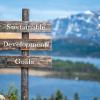The TISS group explores innovative solutions to environmental issues that integrate social, institutional, and governance drivers with technological and economic considerations, with an emphasis on improving conditions for the most deprived and marginalized in society.
The research objective of TISS is to identify, analyze and promote innovative technological, social and institutional solutions for human development that leave no one behind and that respect planetary boundaries. Novel approaches are required to achieve a rapid transformation that reconciles much needed human development, particularly for the most deprived and marginalized in society, with environmental preservation and ecosystems restoration. Such solutions span a wide range from digital service provision, to integrated sharing and circular economy concepts, to decentralized, distributed infrastructures which empower active “prosumers”. Central to them all is that they can provide improved access to and provision of services critical for human well-being (nutrition, shelter, health, mobility, communication, social interactions) with vastly reduced resource and environmental footprints.
TISS research emphasizes particularly two focal areas:
- A systemic analysis of technological, social and institutional innovations (including inter alia new business models, social entrepreneurship, and novel public policy designs) with a focus on end-use services for human wellbeing that minimize negative environmental impacts.
- Integration of heterogeneity, governance, distributional and equity considerations in policy analysis and implementation under a broader framing of transformations towards resilient & sustainable futures.
TISS research can draw both on the accumulated research achievements of its research staff, novel methodological approaches, as well as a wide array of online resources (see also below) made available for the use of the wider scientific and policy communities and that provided critical inputs to the work of the IPCC and The World in 2050 Initiative. Important research TISS can build on include for example (see below links to selected publication highlights): A thorough understanding of innovation systems combining conceptual with detailed empirical case studies; search on granular technology options and their advantages for equitable access to services and for rapid upscaling; empirical research on distributions and deprivations of access to service provision critical for human development; the influential research on Decent Standards of Living, again combining conceptual theoretical work with empirical quantifications.
The group’s three research areas include:
Energy services and infrastructure for decent living
Access to energy services and basic infrastructures are fundamental to meeting basic human needs, and a key requirement in the fight to eradicate poverty around the world and achieve decent living standards (DLS) Using the lens that people demand amenities and services rather than products and goods, this research entails both a diagnostic (identification of provisioning gaps) as well as a policy dimension (identifying novel options and crafting strategies for their rapid rollout and implementation). This research can build on considerable in-house knowledge, data and tools that were developed in pioneering work on describing heterogeneity in levels of service provisioning, a broader focus on distributive justice in human and planetary wellbeing, and the multiple dimensions of inequality, modeling energy access, as well as the development of the concept of Decent Standards of Living.
Technological, social, and institutional innovation for development
Meeting development needs under planetary boundaries requires novel solutions combining technological, social and institutional innovations which are interdependent. TISS research aims to identify those novel solutions that provide needed services while minimizing negative environmental externalities and provide new business and economic opportunities for development. Examples include digital service provisions and novel forms of shared mobility that seamlessly integrate public transport with on-demand private mobility via shared vehicle fleets. This research can draw on considerable in-house expertise on innovation systems and the determinants of successful (or unsuccessful) innovations from two decades of prior research at IIASA.
Governance and institutional structures
Quality of institutions and effective governance are some of the key enablers of feasible transformations of our societies and economies towards a climate-neutral and sustainable world. TISS research is building bridges between political science and political economy approaches, and quantitative scenarios and modeling efforts, to enhance the representation of governance and institutional capacities that, for instance, effect the extent to which adaptive capacity of a society is constrained or climate policies and low-carbon transition pathways are feasible. Work in this area aims to contribute to understanding of the role of policies, institutions and governance in sustainable energy system transitions.
Online Resources, Tools, and Databases
- Energy Primer Textbook
- Scaling Dynamics of Energy Technologies Data Base SD-ET
- Energy and Carbon Emissions Uncertainties Data Base ECDB
- Primary, Final and Useful Energy Data Base PFUDB
- Logistic Substitution Model software LSM2
- Energy Access Tool
- Fair Mitigation Tool
- Case Studies on Energy Technology Innovation
Selected Publications Highlights
- Creutzig, F., Niamir, L. , Bai, X., Callaghan, M., Cullen, J., Díaz-José, J., Figueroa, M., Grubler, A. , et al. (2022). Demand-side solutions to climate change mitigation consistent with high levels of well-being. Nature Climate Change 12 36-46. 10.1038/s41558-021-01219-y.
- Grubler, A. , Wilson, C. , Bento, N., Boza-Kiss, B. , Krey, V. , McCollum, D., Rao, N. , Riahi, K. , et al. (2018). A low energy demand scenario for meeting the 1.5 °C target and sustainable development goals without negative emission technologies. Nature Energy 3 (6) 517-525. 10.1038/s41560-018-0172-6.
- Kikstra, J., Mastrucci, A. , Min, J. , Riahi, K. , & Rao, N.D. (2021). Decent living gaps and energy needs around the world. Environmental Research Letters 16 (9) 095006. 10.1088/1748-9326/ac1c27.
- Pachauri, S. , Pelz, S. , Bertram, C., Kreibiehl, S., Rao, N.D. , Sokona, Y., & Riahi, Keywan (2022). Fairness considerations in global mitigation investments. Science 10.1126/science.adf0067.
- Rao, N. & Min, J. (2017). Decent Living Standards: material prerequisites for human wellbeing. Social Indicators Research 1-20. 10.1007/s11205-017-1650-0.
- TWI2050 - The World in 2050 (2020). Innovations for Sustainability. Pathways to an efficient and post-pandemic future. Report prepared by The World in 2050 initiative. International Institute for Applied Systems Analysis (IIASA) , Laxenburg, Austria. 10.22022/TNT/07-2020.16533.
- Wilson, C. , Grubler, A. , Bento, N., Healey, S., De Stercke, S., & Zimm, C. (2020). Granular technologies to accelerate decarbonization. Science 368 (6486) 36-39. 10.1126/science.aaz8060.
- Zimm, C. (2019). Methodological issues in measuring international inequality in technology ownership and infrastructure service use. Development Studies Research 6 (1) 92-105. 10.1080/21665095.2019.1605533.
- Andrijevic, M., Crespo Cuaresma, J., Muttarak, R., & Schleussner, C. F. (2020). Governance in socioeconomic pathways and its role for future adaptive capacity. Nature Sustainability, 3(1), 35-41.
- Brutschin, E., Pianta, S., Tavoni, M., Riahi, K., Bosetti, V., Marangoni, G., & Van Ruijven, B. J. (2021). A multidimensional feasibility evaluation of low-carbon scenarios. Environmental Research Letters, 16(6), 064069.
- Hickmann, T., Bertram, C., Biermann, F., Brutschin, E., Kriegler, E., Livingstone, J. E., ... & Van Vuuren, D. (2022). Exploring global climate policy futures and their representation in integrated assessment models. Politics and Governance, 10(3), 171-185
Models, tools, datasets
Projects
Staff
News

06 February 2025
Rethinking energy demand can foster sustainable development and reduce emissions from buildings and transport

05 February 2025
Gender equality is crucial for a climate resilient future

24 January 2025
Delegation from Greece visits IIASA to explore further collaborations
Events
Focus

07 November 2024
COP29 in Baku is a Climate Finance COP: It’s about justice
At the COP in Baku, Azerbaijan, nation states must decide on a new climate finance regime, that will take effect from 2025. Studies show that by 2030, a sixfold increase in international financing is needed globally, for the needed mitigation investments alone. As tensions rise over who should pay, it will be difficult to achieve new and fair targets. Success is crucial to keep the Paris Agreement within reach.

04 November 2024
Overshooting 1.5°C is risky – that’s why we need to hedge our bets
In a new article published on The Conversation, Carl-Friedrich Schleussner, Gurav Ganti, and Joeri Rogelj discuss the urgent need to accelerate global emissions reductions to limit global warming to 1.5°C, cautioning against reliance on overshoot scenarios that assume temporary warming above 1.5°C, which may lead to irreversible climate impacts.
Publications
European Scientific Advisory Board on Climate Change (2025). Scaling up carbon dioxide removals – Recommendations for navigating opportunities and risks in the EU. European Scientific Advisory Board on Climate Change , Copenhagen, Denmark. 10.2800/3253650. Akkiraju, K. & Rao, N. (2025). Higher income is associated with greater life satisfaction, and more stress. Communications Psychology 3 (1) 10.1038/s44271-025-00210-z. Montfort, S., Fesenfeld, L., Ingold, K., Lamb, W.F., & Andrijevic, M. (2025). Political enablers of ambitious climate policies: a framework and thematic review. npj Climate Action 4 (1) e14. 10.1038/s44168-024-00206-1. Shindell, D. & Rogelj, J. (2025). Preserving carbon dioxide removal to serve critical needs. Nature Climate Change 10.1038/s41558-025-02251-y. (In Press) Low, S., Brutschin, E. , Baum, C.M., & Sovacool, B.K. (2025). Expert perspectives on incorporating justice considerations into integrated assessment modelling. npj Climate Action 4 (1) e10. 10.1038/s44168-025-00218-5.











